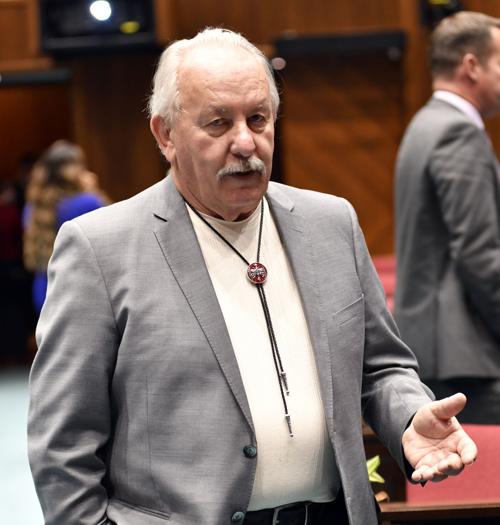PHOENIX — Arizona lawmakers are moving to block state agencies from giving a third option for those who identify as neither male nor female.
HB 2294 would put in statute that any document issued by a state agency, board, commission or department that now is required to indicate an individual’s sex may only show that person as male or female.
The measure was approved this past week by the House Committee on Government and Elections, with only Republicans in favor, despite pleas from multiple parents who said those choices do not define who their children are. It now awaits a vote of the full House.
Rep. John Fillmore, R-Apache Junction, said he believes there currently are no forms that provide an alternative. Instead, he called it “kind of a precautionary thing,” given that other states, including California, do allow that option.
“Historically, what happens in California is like a tidal wave,” Fillmore said. “It just kind of rolls our way.”
But unbeknownst to Fillmore, that already is happening: The Arizona Department of Transportation does provide an option for driver licenses to have an X instead of M or F where “sex” is listed.
That, however requires an applicant to present a government document — presumably from another state — showing their gender as non-binary. It is not an option for an Arizonan simply seeking a change in designation.
Fillmore said all his measure does is recognize reality.
“There are two biological sexes,” he said, regardless of how people identify themselves.
Not true, testified Erica Keppler, telling lawmakers that about 1.3 out of every 1,000 children born are “intersex,” with “ambiguous” visible sex organs.
“It used to be they were assigned a sex at birth, sometimes with surgical alteration, often to tragic results when later on they did identify with the sex assigned to them,” Keppler said.
And Kristin Downing, said it’s not just about those children. Downing told lawmakers she drove up from Tucson to tell them about her “amazing 15-year-old child” who is nonbinary.
“When they came out about three years ago, our whole community rallied around us,” she said.
“My child is loved and celebrated for who they are,” Downing continued. “However, every time we have to fill out paperwork, my child does not feel supported because the fact is the state of Arizona only has male and female as options on a form.”
And that, Downing said, will become even more obvious when her child goes for a driver’s license and will have to choose a sex that does not accurately reflect gender.
Megan Mogan, another Tucson mother, had her own story.
“From the moment our non-binary child could walk, could talk, could play, could dress themselves, it was very clear to us that they did not conform to typical gender standards, even though all they saw under their own roof was pretty stereotypical gender standards,” she said.
Mogan said that did require a learning curve, even among her own parents in their 70s.
“What we learned is that gender is very nuanced,” she said. “It’s not what we grew up knowing.”
Fillmore said people can still identify as what they believe they are. But that doesn’t make it true.
“I identify as a little, short, fat, obnoxious guy,” he said.
“And everyone agrees with me,” Fillmore continued. “But then, again, the day I said I was a multi-millionaire that looked like Troy Donahue, they all kind of rolled their eyeballs.”
He said that’s their business.
“But we need to have some kind of uniformity or structure as a society in order to be able to deal with this,” Fillmore said.
House Minority Leader Reginald Bolding, D-Laveen, said things aren’t that simple. Consider, he said, the issue of people who are of mixed race.
“In many cases you may be asking people whether you are Black or white or Hispanic or Native,” Bolding said. He said those categories have evolved and changed with time.
Rep. John Kavanagh, R-Fountain Hills, said sometimes people have to choose from what are the legal options, saying that’s the case with the U.S. Census.
That, however, is not true.
In 2000 the federal agency for the first time allowed those who do not identify as white to choose not just Black or African American, American Indian or Alaska native, Asian or Pacific Islander, or some other race, to say they are two or more races. And by 2020 more than 11 percent picked that option.
Kavanagh, asked about that later, said he would be “more than open” to provide an alternative designation to someone who is biologically more than one gender or has more than one gender’s physical attributes. But that’s it.
“I do not think that a person who is a biological male or female should be able to say they’re something else just because in their minds they are,” Kavanagh said.
And Rep. Teresa Martinez, R-Casa Grande, said sometimes people just have to choose, citing the experience of her mixed-race son, who is sometimes asked about his race.
“He just picks one,” she said. “And then he lives his life and he enjoys the many benefits of the different cultures.”
Bolding, however, said he doesn’t see the harm in the state acknowledging that sometimes choices are not binary.
“By simply mandating that individuals have to check a ‘male’ or ‘female’ box I think is hypocritical to what we want to do as a state,” he said. “We want to make sure we’re a welcoming state, an open place, and we allow people to be who they are.”
Fillmore, however, said he sees it as a matter of accuracy and truth, saying it’s no different than letting people unilaterally decide their own race.
“During the 1970s and 1980s when they had affirmative action, I would have loved to identify as Black,” he said. “But I didn’t think I could get away with that one.”





